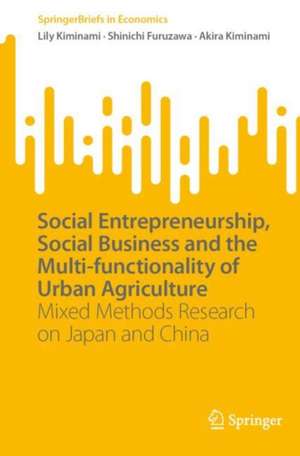Social Entrepreneurship, Social Business and the Multi-functionality of Urban Agriculture: Mixed Methods Research on Japan and China: SpringerBriefs in Economics
Autor Lily Kiminami, Shinichi Furuzawa, Akira Kiminamien Limba Engleză Paperback – 17 apr 2022
It is widely agreed that a sustainable city should meet the needs of the present generation without sacrificing the ability of future generations to meet their own needs. However, there has been no completely agreed-upon definition for what a sustainable city should be nor upon the paradigm for what components should be included. On the other hand, there is a possibility that the multi-functions of urban agriculture may attract especially those who are thinking creatively. These creative thinkers have a high level of social capital, pay attention to social issues, and are greatly motivated to find solutions through social enterprises such as agriculture-related business.
Din seria SpringerBriefs in Economics
-
 Preț: 444.35 lei
Preț: 444.35 lei -
 Preț: 264.79 lei
Preț: 264.79 lei - 15%
 Preț: 462.51 lei
Preț: 462.51 lei -
 Preț: 47.33 lei
Preț: 47.33 lei -
 Preț: 353.14 lei
Preț: 353.14 lei -
 Preț: 273.32 lei
Preț: 273.32 lei -
 Preț: 376.04 lei
Preț: 376.04 lei -
 Preț: 379.09 lei
Preț: 379.09 lei -
 Preț: 380.07 lei
Preț: 380.07 lei -
 Preț: 377.35 lei
Preț: 377.35 lei -
 Preț: 379.09 lei
Preț: 379.09 lei -
 Preț: 376.59 lei
Preț: 376.59 lei -
 Preț: 408.27 lei
Preț: 408.27 lei -
 Preț: 379.09 lei
Preț: 379.09 lei -
 Preț: 383.27 lei
Preț: 383.27 lei -
 Preț: 378.54 lei
Preț: 378.54 lei -
 Preț: 377.95 lei
Preț: 377.95 lei -
 Preț: 340.23 lei
Preț: 340.23 lei -
 Preț: 380.25 lei
Preț: 380.25 lei -
 Preț: 378.12 lei
Preț: 378.12 lei -
 Preț: 376.04 lei
Preț: 376.04 lei -
 Preț: 376.04 lei
Preț: 376.04 lei -
 Preț: 379.68 lei
Preț: 379.68 lei -
 Preț: 381.00 lei
Preț: 381.00 lei -
 Preț: 375.23 lei
Preț: 375.23 lei -
 Preț: 376.80 lei
Preț: 376.80 lei -
 Preț: 378.54 lei
Preț: 378.54 lei -
 Preț: 377.57 lei
Preț: 377.57 lei -
 Preț: 376.04 lei
Preț: 376.04 lei -
 Preț: 378.92 lei
Preț: 378.92 lei -
 Preț: 375.62 lei
Preț: 375.62 lei -
 Preț: 379.09 lei
Preț: 379.09 lei -
 Preț: 353.67 lei
Preț: 353.67 lei -
 Preț: 342.14 lei
Preț: 342.14 lei -
 Preț: 375.45 lei
Preț: 375.45 lei -
 Preț: 379.09 lei
Preț: 379.09 lei -
 Preț: 377.35 lei
Preț: 377.35 lei -
 Preț: 344.86 lei
Preț: 344.86 lei -
 Preț: 377.35 lei
Preț: 377.35 lei -
 Preț: 345.89 lei
Preț: 345.89 lei -
 Preț: 377.57 lei
Preț: 377.57 lei -
 Preț: 343.83 lei
Preț: 343.83 lei -
 Preț: 378.12 lei
Preț: 378.12 lei -
 Preț: 345.06 lei
Preț: 345.06 lei -
 Preț: 379.48 lei
Preț: 379.48 lei -
 Preț: 379.48 lei
Preț: 379.48 lei -
 Preț: 380.07 lei
Preț: 380.07 lei -
 Preț: 375.45 lei
Preț: 375.45 lei -
 Preț: 445.33 lei
Preț: 445.33 lei -
 Preț: 378.54 lei
Preț: 378.54 lei
Preț: 410.94 lei
Nou
Puncte Express: 616
Preț estimativ în valută:
78.64€ • 82.48$ • 65.46£
78.64€ • 82.48$ • 65.46£
Carte tipărită la comandă
Livrare economică 01-15 aprilie
Preluare comenzi: 021 569.72.76
Specificații
ISBN-13: 9789811917615
ISBN-10: 9811917612
Pagini: 99
Ilustrații: XV, 99 p. 25 illus., 3 illus. in color.
Dimensiuni: 155 x 235 mm
Greutate: 0.17 kg
Ediția:1st ed. 2022
Editura: Springer Nature Singapore
Colecția Springer
Seria SpringerBriefs in Economics
Locul publicării:Singapore, Singapore
ISBN-10: 9811917612
Pagini: 99
Ilustrații: XV, 99 p. 25 illus., 3 illus. in color.
Dimensiuni: 155 x 235 mm
Greutate: 0.17 kg
Ediția:1st ed. 2022
Editura: Springer Nature Singapore
Colecția Springer
Seria SpringerBriefs in Economics
Locul publicării:Singapore, Singapore
Cuprins
Chapter 1. Introduction.- Chapter 2. Literature Review on CC, SC, SE, SB and MFUA.- Chapter 3. Situation of Urban Agriculture in China and Japan.- Chapter 4. Theoretical Framework, Hypothesis and Methodology.- Chapter 5. Hypothesis Verification.- Chapter 6. Conclusion and Policy Implication.
Notă biografică
Lily Kiminami, Niigata University
Shinichi Furuzawa, Niigata University
Akira Kiminami, The University of Tokyo
Textul de pe ultima copertă
This is the first book to clarify the relationships between multi-functions of urban agriculture, creative classes, and social business in China and Japan. Specifically, it constructs a new framework showing how these factors contribute to the sustainability of cities by introducing the mixed methods research of structural equation modeling and the trajectory equifinality model. Policy implications drawn from the research suggests that governments should provide opportunities to create a virtuous cycle to improve the accumulation of social capital in order to attract those who think creatively.
It is widely agreed that a sustainable city should meet the needs of the present generation without sacrificing the ability of future generations to meet their own needs. However, there has been no completely agreed-upon definition for what a sustainable city should be nor upon the paradigm for what components should be included. On the other hand, there is a possibility that the multi-functions of urban agriculture may attract especially those who are thinking creatively. These creative thinkers have a high level of social capital, pay attention to social issues, and are greatly motivated to find solutions through social enterprises such as agriculture-related business.
Caracteristici
Analyzes the impacts of creative classes and social entrepreneurship on urban agriculture and sustainability Uses mixed methods research to conduct a comparative analysis of urban agriculture in China and Japan Derives policy implications for sustainable urban development through social business and social entrepreneurship
